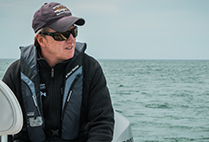Nonfiction
Bleaker House: Chasing My Novel to the End of the World
Nell Stevens (GRS’13)
Doubleday
WHEN STEVENS APPLIED for the Creative Writing Program’s Global Fellowship, a grant that allows graduates a stay of up to three months abroad, she did not elect to travel to a tropical locale or a cosmopolitan city, as did most of her classmates. Instead, Stevens chose sparsely populated Bleaker Island in the Falklands, land of penguins and rain. There, she believed, the solitude would help her work on the novel she’d always wanted to write. And although the manuscript she wrote on Bleaker Island was never published, the trip was the impetus for her debut novel.

Bleaker House, a titular nod to the island and to the Charles Dickens novel Bleak House, is a personal narrative of sorts. Part memoir, part travelogue, the book traces Stevens’ writing path. She includes scraps of her unpublished novel, highlighting her structured writing process in passages titled with headers like “Situation,” “Complication,” and “Climax.” She also weaves in aphorisms by Leslie Epstein, a College of Arts & Sciences English professor—“Limit your similes to two a page”—as well as flashbacks to her pre-MFA days, when she worked at a human rights organization and would write fiction in the columns of expense spreadsheets.
She takes readers through her time on the dreary island, plunging introspectively into her neuroses concerning the novel she is trying to write and her dwindling food supply (she had to bring most of it with her in a suitcase). Anyone who has aspired to write a novel will empathize with Stevens’ passion and desperation as she becomes a prisoner of this manuscript, trudging through its sluggish plot. The chains are broken at the end of her stay, when she acknowledges what she has known for some time: the novel is bad. What she does not realize until later is that she has left Bleaker Island with the foundation for a great book—just not the one she had expected to write.—MARA SASSOON
John Pendleton Kennedy: Early American Novelist, Whig Statesman & Ardent Nationalist
Andrew R. Black (GRS’12)
Louisiana State University Press
LONG BEFORE JOHN FITZGERALD Kennedy stepped onto the American political stage, there was John Pendleton Kennedy (1795–1870), an eminent statesman, lawyer, and novelist from Baltimore. This Kennedy (no relation to JFK) would play an important role in the establishment of the Whig Party, which advocated economic protectionism to stimulate manufacturing.
In his absorbing biography of Kennedy, Black brings to light this long-forgotten antebellum figure. While a few other books have been written about him, Black’s purports to be the first to explore the relationship between Kennedy’s fiction and his political beliefs.
He shows us how Kennedy grappled unsuccessfully with the institution of slavery in his literary work, particularly Swallow Barn, a novel about plantation life in Virginia. Kennedy refused to own slaves, but privately he believed that free blacks were “a dishonest and worthless class,” and he often depicted them in racially disparaging language in his fiction. His ambivalence reflected the Whig Party’s inability to form a cohesive policy on slavery, one of the issues that led to its downfall in the early 1860s, less than three decades after it was formed.
Kennedy believed deeply in national unity and patriotism. The son of a failed businessman who immigrated to Maryland from Northern Ireland, he was shrewd and ambitious, with what Black calls a “zealous campaign for self-improvement.” And his views were shaped by the political uncertainty that gripped the nation during its infancy. Drawn to public life at an early age, he served as a congressman and later as secretary of the navy under President Millard Fillmore. As an author, he enjoyed some measure of success, earning the admiration and friendship of writers Washington Irving and J. Fenimore Cooper, and later, Edgar Allan Poe and Charles Dickens.
Kennedy lived through some of the most tumultuous political moments in the nation’s early history, including the War of 1812, which spurred his sense of nationalism, and the Civil War. By the time of his death, he had seen the United States transformed from an agrarian nation into an industrial powerhouse.
As Black writes, Kennedy’s “youthful jingoism” had been replaced with a conservative restraint, but the moral certitude that had governed his literary and political passions remained very much intact.—JOHN O’ROURKE
Book Briefs
Romance, Compassion, and World War I Battle Sites
Illustration by James Yang
A good book can provide a brief distraction from the dissatisfactions of the real world. For Neave, a protagonist in The Romance Reader’s Guide to Life (Flatiron Books, 2017) by Sharon Pywell (GRS’89), that book is the steamy romance The Pirate Lover. Neave starts to read the book as an escape from her closed-minded Massachusetts town, and from living in the shadow of her glamorous older sister, Lilly. For years, she returns to the book to avoid life’s hardships, but when Lilly goes missing, Neave must finally learn to contend with the real world. Pywell’s command over her characters’ nuanced voices shines as she alternates chapters from many perspectives—Neave’s, Lilly’s, and even that of their dog, Mr. Boppit. And of course, the reader is treated to excerpts from The Pirate Lover as the parallels between the romance and Neave’s own life unfold.
It’s time to be less self-involved. That’s what Christopher Kukk (CAS’92) proclaims in The Compassionate Achiever (HarperCollins, 2017), a four-step guide to becoming a more compassionate person. Kukk suggests that success doesn’t come from looking out only for yourself, but from caring about others. He outlines the steps a compassionate person should take in what he calls the LUCA (listening, understanding, connecting, acting) program, and explains each element in depth, reviewing case studies and providing methods of execution. Kukk practices what he preaches—he is the founding director of the Center for Compassion, Creativity and Innovation at Western Connecticut State University.
Travel to the French countryside with Richard Rubin (GRS’91) in Back Over There (St. Martin’s Press, 2017). Rubin traces a chronological route through the sites of World War I battles, combining historical accounts and interviews with locals and other historians. Inspired by Rubin’s 2014 New York Times series, this colorful travelogue underscores the profound impact of the war.—MARA SASSOON



















































I am an alumnus (GRS 1977) and have published my latest novel, Land of the Sun, Land without Light. How can I submit my novel for your review? Here’s a recent review by a professor of Literature:
When a young Peace Corps volunteer is recruited for a “second job,” we are thrust into a new heart of darkness—and light. A rich, thrilling LeCarre-esque journey into the tribal and geopolitical wars of 1960s Africa.
Kenneth W. Davis, Professor Emeritus of English, Indiana University
Best regards, David
Hi David,
Thanks for writing, and congratulations on your book! You can send it to Mara Sassoon, at the address below. We’ll announce it in the fall Bostonia (our summer issue, due out in July, is already full.)
All my best,
Cindy Buccini
Editor
Bostonia Magazine
43 Hawes Street
Brookline, MA 02446